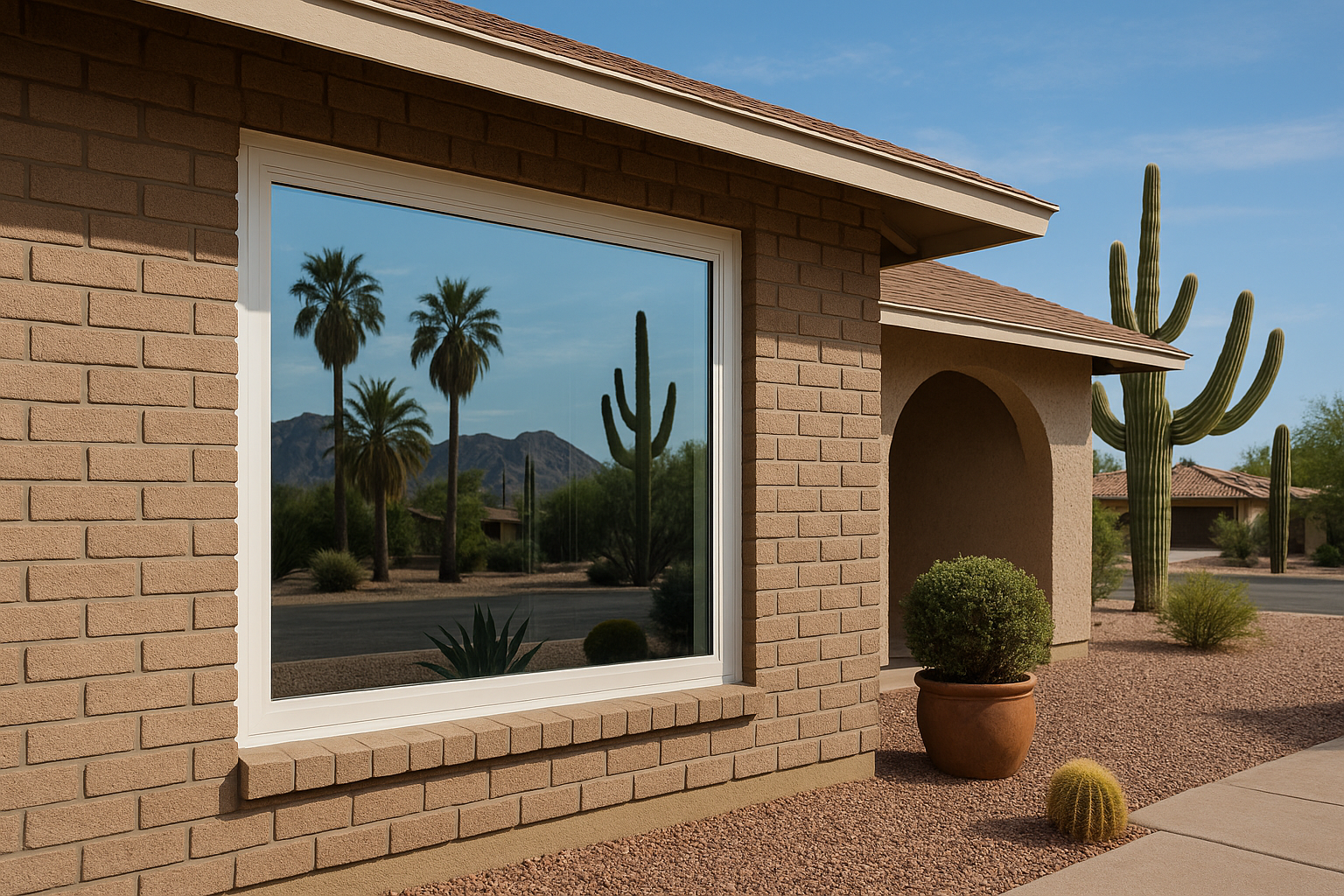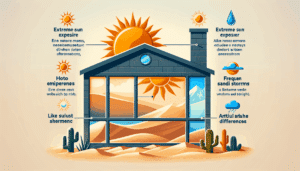There is that distinct, stomach-dropping sound of a baseball hitting a living room window, or maybe it’s just the quiet realization that your view of the Superstition Mountains is getting cloudy from condensation. Living here in the Valley, we know our homes take a serious beating from the elements, but figuring out who pays to fix that broken pane shouldn’t be harder than enduring a July afternoon without A/C. Let’s strip away the legal jargon and look at what actually keeps your wallet safe when your glass gives up the ghost.
Contents
- 1 Wait, Are Warranty and Guarantee the Same Thing?
- 2 The “Lifetime” Myth and What It Really Means
- 3 Glass Breakage vs. Seal Failure: Know the Difference
- 4 The “Labor Loophole” You Need to Watch For
- 5 The Arizona Factor: Why Our Heat Changes the Rules
- 6 Transferability: Selling Your Home?
- 7 How Not to Void Your Warranty
- 8 The Bottom Line on Protection
Wait, Are Warranty and Guarantee the Same Thing?
Honestly, most people use these words interchangeably, like “soda” and “pop,” but in the window industry, they are two very different beasts. If you take nothing else away from this, remember this distinction because it could save you thousands down the road.
Usually, a warranty comes from the manufacturer—the folks who actually built the glass unit or the vinyl frame. They are promising that their product won’t fail due to a defect in their factory process. On the other hand, a guarantee typically comes from the installation company (that’s us, or whoever you hired). This covers the workmanship.
Think of it like this: if you buy a high-end TV and the screen goes black, that’s a manufacturer warranty issue. If the guy mounting it on your wall drops it or uses the wrong screws so it falls off a week later? That’s on the installer.
Here is how the split usually looks:
- Manufacturer Warranty: Covers the glass seal failing, the Low-E coating flaking off, or the vinyl frame turning yellow from the sun.
- Workmanship Guarantee: Covers issues like drafts caused by poor caulking, leaks around the frame, or a window that won’t open smoothly because it wasn’t squared up right.
You need both. A great window installed poorly is a disaster, and a perfect installation of a lemon window is just a waste of time.
The “Lifetime” Myth and What It Really Means
You see it plastered on trucks and websites everywhere: “Lifetime Warranty!” It sounds amazing, right? Like you can pass these windows down to your grandkids. But you know what? “Lifetime” is a slippery word in contract law.
Does it mean your lifetime? The lifetime of the house? Or the “expected lifetime” of the product, which might only be seven years?
In most cases, a legitimate lifetime warranty covers the original purchaser for as long as they live in the home. However, the devil is in the details. Some warranties are “pro-rated.” This means that in the first few years, you get 100% coverage. But by year 10, the manufacturer might only cover 50% of the cost of the glass, leaving you to foot the bill for the rest.
And let’s be real for a second—sometimes companies disappear. A warranty is only as good as the paper it’s printed on and the stability of the company standing behind it. That is why we always recommend sticking with established brands and local installers who have been in Maricopa County long enough to see a few market cycles come and go.
Glass Breakage vs. Seal Failure: Know the Difference
This is where things get a little technical, but bear with me. Not all broken glass is treated equally. Most standard manufacturer warranties cover seal failure.
If you look at your dual-pane windows, there is a spacer between the two pieces of glass. That space is usually filled with argon gas to slow down heat transfer (essential for our Arizona summers). If that seal pops, moisture gets in. Suddenly, your window looks foggy or milky. That is a defect. Manufacturers usually cover the cost of a new IGU (Insulated Glass Unit) if this happens.
But what about actual breakage?
- Stress Cracks: These happen naturally. Sometimes, a shadow hits a hot window weirdly, thermal stress builds up, and crack—it splits without anything touching it. This is usually covered for the first year or two.
- Impact Breakage: This is when your neighbor’s kid hits a golf ball through the den window. Standard warranties almost never cover this. That is an insurance claim or an out-of-pocket expense.
However, some premium glass packages do offer accidental glass breakage warranties. It’s usually an upsell, but if you live on a golf course or have rowdy kids, it might be worth asking about.
The “Labor Loophole” You Need to Watch For
Here is a scenario that drives homeowners crazy. Imagine your window seal fails five years after installation. You call the manufacturer, and they say, “Good news! You’re covered. We are shipping you a new sash for free.”
Great, right? Except the sash arrives in a box on your porch. Now, who is going to install it?
Many manufacturer warranties are material only. They give you the part, but they don’t pay for the technician to come out, take the old sash out, and put the new one in. You might end up paying a service call fee and an hourly labor rate that costs almost as much as just buying a new window.
This is where your local installer’s guarantee becomes the MVP. A solid local window company in Arizona will often bridge that gap. We might say, “If the manufacturer sends the part, we will put it in for free,” or at least offer a reduced labor rate for our past customers. Always ask: Does this warranty cover both parts and labor?
The Arizona Factor: Why Our Heat Changes the Rules
We have to talk about the elephant in the room—or rather, the giant ball of fire in the sky. The sun in Maricopa County doesn’t play nice. We regularly see temperatures over 110 degrees, and surface temperatures on glass can get much, much hotter.
This extreme heat causes materials to expand and contract drastically between day and night. It puts massive stress on vinyl frames and glass seals.
Some national window brands just aren’t built for the desert. A warranty from a company based in Minnesota might have exclusions for “extreme heat” or “thermal distortion.” I’ve seen cheap vinyl frames literally warp and bow because they couldn’t handle the UV exposure here.
When reading your paperwork, look for:
- Heat Tolerance: specifics about vinyl discoloration or warping.
- Argon Retention: Guarantees that the gas won’t leak out rapidly in high temps.
- Hardware: Sand and dust are rough on rollers and locks. Does the warranty cover moving parts?
If a warranty looks generic, it might not protect you here. You want protection that understands the difference between a sunny day in Seattle and a scorched-earth afternoon in Phoenix.
Transferability: Selling Your Home?
Life happens. You get a new job, or you want to downsize. You put your house on the market. New windows are a huge selling point, but can you pass that warranty on to the new owners?
This is a feature called transferability, and it varies wildly.
- Non-transferable: The warranty dies the moment you sign the deed over to someone else.
- Fully Transferable: The new owner gets the remaining balance of the warranty (this is a massive value add for resale).
- Transferable with a Fee: The new owner has to fill out a form and pay maybe $50 or $100 within 30 days of closing to activate the warranty.
If you are planning to sell in the next 5 to 10 years, getting a transferable warranty is a smart investment. It’s a tangible asset you can put on the listing sheet. “New windows with 15 years remaining on warranty” sounds pretty good to a buyer worried about maintenance costs.
How Not to Void Your Warranty
You know what? It’s surprisingly easy to accidentally kill your warranty coverage. I’ve seen it happen, and it is heartbreaking to tell a homeowner they are out of luck because of a DIY mistake.
Common ways to void your protection:
- Tinting your windows: This is the big one. Applying after-market tint film can trap heat inside the glass unit, causing seal failure or stress cracks. Most manufacturers will instantly void the glass warranty if you apply your own tint.
- Drilling into the frame: Trying to install blinds or alarm sensors and putting a screw through the drainage path or the vinyl chamber can ruin the unit’s integrity.
- Pressure washing: Blasting your windows with high-pressure water can force moisture past the seals and damage the weeping system.
- Painting vinyl: Unless the manufacturer specifically says the vinyl is paintable, don’t do it. The chemicals can weaken the plastic.
If you are thinking about modifying your windows in any way, check the paperwork first or give us a call. It’s better to ask a silly question than to lose your coverage.
The Bottom Line on Protection
At the end of it all, a warranty is really just peace of mind. It’s knowing that if the product fails, or if the installation wasn’t quite right, you aren’t going to be left holding the bag.
It’s easy to get caught up in the aesthetics—the frame color, the grid pattern, the way the light hits the floor. And don’t get me wrong, that stuff matters. But the boring paperwork? That’s what protects your investment.
When you are shopping for windows, don’t just look at the price tag. Look at the promises made by the company. Ask the tough questions about labor costs, accidental breakage, and what happens if the Arizona sun throws a temper tantrum.
If you are feeling a bit overwhelmed by the fine print, or if you just want straight answers about replacing your glass with a guarantee that actually means something, we are here to help. We’ve been navigating Maricopa County codes and climate for years, and we stand behind our work.
Let’s get your home protected and looking great.
Give us a call at 480-526-4456
or Request a Free Quote online today.




